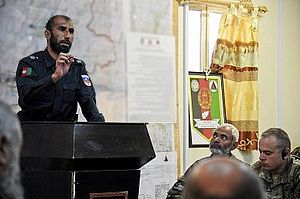Among the greatest hits of a popular wedding singer in Tarin Kot, the capital city of the Afghan province that has produced such specimens as Mullah Omar and the man who cut off the nose of the girl on the 2010 Time cover, is a ditty about an illiterate former taxi driver, set to rebab and accordion. “Across the mountains all the people know you / For you have killed many Talibs with your bare hands / God has saved you every time / You are Matiullah Khan.”
But if you believe the reports of Afghan security officials, God did not save Matiullah Khan – a warlord and longtime U.S. patron in the Afghanistan War – from a cross-dressing suicide bomber who lured him into the backstreets of Kabul’s police district 6 one night last March. The assassination, and the demure reaction of U.S. and Afghan officials, suggests Afghanistan is moving beyond the days when American counterinsurgents channeled tens of millions of dollars to anti-Taliban strongmen, and is thus in line with the White House’s February National Security Strategy declaration that “we have moved beyond the large ground wars in Iraq and Afghanistan that defined so much of American foreign policy over the past decade.”
Yet war has not yet moved beyond the elders of Uruzgan, where Matiullah’s replacement as police chief was shot dead by a suspected Taliban infiltrator last Sunday. They remain suspicious of the circumstances and contradictory official reports of the death of Matiullah, a man as infamous for his security precautions as he was for his summary executions of alleged Talibs. They wonder how he was seen exiting his downtown hotel on his cell phone during a rare visit to Kabul one moment, only to be blown up across town the next. Being quite familiar with the various compositions of corpses of suicide bombings, they wonder how his remained intact. Not having received any public condolences from President Ashraf Ghani, they have led protests of thousands in Tarin Kot, threatening to renounce a government that has moved beyond them.
War has not yet moved beyond the 9,800 U.S. troops that U.S. President Barack Obama decided last month would stay in Afghanistan through the end of 2015, either. That decision reversed plans to close a U.S. base in Jalalabad, where a U.S. soldier was killed two weeks later, and where a suicide bomber killed 35 Afghans a week after that. Initial reports that the suicide bombing was the work of the Islamic State have since been disputed by U.S. officials, giving way to familiar reports of Taliban and Pakistani involvement, which cohere less conveniently with joint U.S.-Afghan calls in March for “reconciliation” with the Taliban and “dialogue” with Pakistan.
Afghanistan, in other words, is refusing to fade in complexity as quickly as it fades in strategic importance. After all, it is the Islamic State leader Abu Bakr al Baghdadi – and not Pakistan-based al Qaeda leader Ayman al Zawahiri nor Taliban leader Mullah Omar (an “ignorant, illiterate warlord, unworthy of spiritual or political respect,” says Baghdadi) – who governs the caliphate that meanders from the mosques of Mosul to the forests of Nigeria to the gates of the U.S. consulate in Benghazi, and who inspired the killing of cartoonists in France last January.
It is tempting, then, for Americans to dismiss Afghanistan’s complexity – to include its Matiullah Khans – as Baghdadi dismisses Mullah Omar: no longer worthy of strategic respect. Yet while the strategy-fatigued American people have pronounced the counterinsurgency manual, like its architect General David Petraeus, guilty, they have refused to completely wash their hands of Afghanistan’s problems, and instead fantasize that they can solve the same problems of Pakistani-fueled religious violence with ten percent of the solution.
Indeed, last December U.S. troop levels dropped from their 2010 peak of 98,000 to 9,800, even as the United Nations reported a 22 percent increase in civilian casualties in 2014, making it the war’s deadliest year. The year also marked a record yield of Afghan opium, a resource whose abundance will spell prosperity for the country’s criminal and terrorist networks for as long as it remains illegal. Meanwhile, even the cultural metrics disappoint: For all the cups of tea shared between U.S. “Religious Support Teams” and Afghans, Kabul in 2015 remains a city in which one faces a public lynching on false accusations of burning a Koran.
Such is the riddle that Matiullah Khan and his forlorn fellow warlords bequeath to the U.S. troops and diplomats who remain. A recent Washington Post article chronicled how the waning U.S. support for Afghanistan’s warlords has pitted them in a “defining fight” for relevance, quoting one Afghan who scoffed at the naïve “Western” dismissal of warlords: “[T]hey have to be respected.” Yet for the White House, which cites “reconciliation” with the Taliban as “the surest way to achieve the full retrograde of U.S. and foreign troops from Afghanistan[,]” the anti-Taliban warlords have outlived their usefulness. Years ago, when they were still useful, one U.S. Army Colonel in Uruzgan with guarded respect for Matiullah Khan asked himself, “At what point is a person too gray and approaching black and just too bad to be tolerated?” It is time for Americans to ask the same question of Afghanistan.
Patrick Knapp is a Captain in the U.S. Army Reserve. He has worked in Afghanistan in a civilian capacity for an aid program in 2011, as a volunteer for a human rights organization in Sulaymaniyah, Iraq, in 2012, and for a Kabul-based NGO in 2013.

































